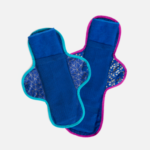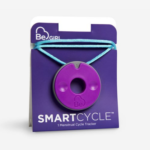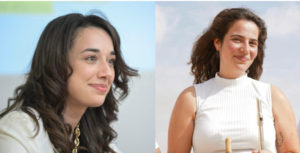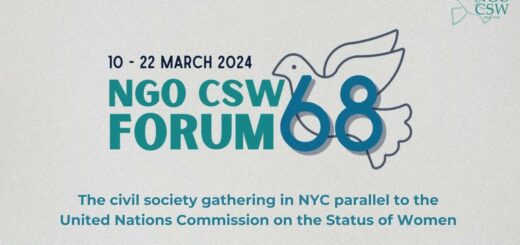CSW 68 Wrap-up
The Commission on the Status of Women (CSW), a functional commission of the United Nations Economic and Social Council (ECOSOC), is a global policy-making body dedicated exclusively to promoting gender equality and the empowerment of women. The Commission was established by an ECOSOC resolution in 1946 with a mandate to prepare recommendations on promoting women’s rights in the political, economic, civil, social and educational fields. The Commission also makes recommendations to the Council on urgent problems requiring immediate attention in the field of women’s rights.
Below are reports from Dr. Mary Ann Rubis (Quaboag Valley Club), Audrey Millgate (Northampton Area Club) and other Zontians who attended the CSW68 forum.
Mary Ann Rubis ~ Impressions from the Commission on the Status of Women 68
This year marked my 12th anniversary attending this annual event, all in person, with the exception of 2021’s virtual session due to COVID. My week in New York is always energizing, inspiring and uplifting!
Proud to be a Zontian
Receiving a pass to attend sessions at the United Nations allowed me to not only participate in side events presented by Permanent Missions, intergovernmental organizations and United Nation entities, but to share information about Zonta International and the Zonta Foundation for Women. In addition, parallel events organized by non-governmental organizations, (like Zonta International), at locations around New York City, highlighted the work that is being done around the world on behalf of women and girls.It was obvious that Zonta International is held in high regard not only by our United Nations partnering organizations but other like-minded organizations as well.
Inspired and amazed
For me, any event hosted by or including teens is a highlight not to be missed. As a teenager, were you thinking about social issues, sharing your views and personal experiences with a room full of individuals of all ages and nationalities, reciting poetry and showing other works of art in public depicting your life? To hear young people, (girls and boys), share their experiences advocating for period products, serving as mentors/leaders to other teens, rising up against poverty or already making a positive impact in their corner of the world was poignant and inspiring.
Aparna Parthasarathy, a Young Women in Public Affairs Scholar and this year’s Zonta International Youth Representative joined Ute Scholz, Zonta International President, Natalia Winder Rossi, Director, Social Policy and Protection, UNICEF and Branda Ng, Manager, Global Partnership and Youth Development Department, Buddhist Tzy Chi Foundation USA as a panelist during the UNICEF USA and Zonta International co-hosted session entitled: “How Strengthening Systems Unlocks Potential to Achieve Gender Equity”. A shocking statistic shared with the audience: at the rate we are going in order for women to have equal status with men will require 131 more years! Social protection is a right!!!
Four event highlights
The Pad Project and Apne Aap: Putting the Last Girl First – Two organizations, women-founded and led. Melissa Berton, Oscar-winning Executive of The Pad Project “A period should end a sentence, not a girl’s education”. Ruchira Gupta, Emmy-winning journalist and Founder of Apne Aap Author of I Kick I Fly
In North Hollywood, California in 2012/2013, high school students learned that girls their own age were missing school because of their periods. They decided to take action by raising funds to purchase a pad-making machine with their NGO partner Action India and documenting the process on film. In 2019, the film “Period. End of Sentence”. won an Academy Award, sparking a global conversation and launching The Pad Project. The Pad Project is now a 501(c)(3) organization, funding menstrual health programs in 13 countries. Internationally, 12 pad machines, eight washable pad programs and two menstrual cup programs have been funded.
Through international partnerships and United States programs this organization is making a difference. Twenty-four states in the United States have partnered with The Pad Project to combat this challenge in our country where, 1 in 4 teens have missed class because they lacked access to menstrual health products! Three states in our very own District 1 are partners: CT, MA and RI.
The average cost of one period in this country was $13.25, ($6,360 over a lifetime). In 2024, this number has skyrocketed to $20 per month due to an increase in the global cost of living. Four US programs are being funded: Pads Across America, Pads for Schools, Leap of Faith and Native Culture Fund. The latter two programs are quite unique. Leap of Faith is a community menstrual equity program. A purple box holds various products. People are asked to take what they need and leave what they can. The Native Cultures Fund, provided grants to three indigenous-led nonprofits to increase product accessibility in this often-overlooked community.
In 2020, an ambassador program was launched with youth as spokespeople in 44 countries. They volunteer their time and talent to advocate, speak on public policy, launch fundraisers etc. In fact, eight teen girls and boys from California spoke during this event.
Apne Aap Women Worldwide is a grassroots Indian organization that empowers marginalized girls and women to resist and end sex trafficking.
Nurturing Equality from Isolation to Celebration: Menstruation and Period Dignity Featuring The Pad Project (see above), Be Girl and Sanitree
 Be Girl
Be Girl
While working in Uganda in 2012, industrial designer Diana Sierra took an umbrella and mosquito netting and created the first prototype for a leak proof barrier that would eventually become a flexipad. Offering fashionable panties, reusable flexipads, menstrual cups and the SmartCycle Menstrual Tracker, her organization Be Girl also provides menstrual educational tools/booklets for teachers, community leaders and girls in Ghana, Mozambique, Kenya and in the near future Mozambique.
Girls living in the Amazon were the inspiration for the innovative SmartCycle Menstrual Tracker. While in the Amazon, Diana heard from girls their belief that if they bathed in the Amazon, they will get pregnant by a dolphin. According to their culture, men turn into dolphins at night. The Tracker was created to teach adolescents about their cycle in a simple and engaging way. The mechanical disk is a calendar that tracks the cycle by linking the numbered days with different icons that represent the key phases of the cycle. A menstrual guide comes with the tracker and is available in seven languages.
Throughout the session, Diana emphasized the importance of respecting and working with cultural differences. Another example was the introduction of the company’s menstrual cup, which is sustainable and cost effective. Again, easy to understand educational tools coupled with advocacy addressed the cultural concern that many had around the loss of a girl’s virginity with its use and therefore a loss of value of the girl. Always innovative and creative, Diana is now incorporating radio soap operas to reach her target audience and adding obstetric fistula to the discussion as more girls are experiencing early pregnancies. We also discussed “Body Literacy”, a term used to describe this all-encompassing education in a way that is more acceptable to men.
 Sanitree
Sanitree
23 million girls in India leave school every year due to their periods. Based in Jaipur, India and Edinburgh, Scotland, Sanitree’s Indian co-operative employs seven local women to produce a reusable cloth pad. The pad can last two years and is the equivalent of 575 disposable pads/year. In addition, the women participate in weekly self-defense, yoga and English language classes run by locals. In Edinburgh, 18 members attending the University of Edinburgh are part of the student-led Sanitree team, consisting of a web designer, content creator, events manager, online sales, writers, social media manager, podcast producer, etc. This team organizes most of the fundraising to support the co-operative. Currently, they are selling the pads in the United Kingdom to generate more funds.
Empowering Women and Girls Through New Technologies in Water and Sanitation Four incredible topics presented from the viewpoints of a lawyer, physician, environmentalist and businesswoman!
- “Addressing Gender Gaps through Access to Water and Sanitation”
- “Water and Health: Importance of Clean Water and Sanitation for Women’s Health and Sustainable Development”
- “Making it Happen through New Technologies for Safe Water Availability and Enhanced Health for Women”
- “Partnering with Agencies: Together, We Build Better and Safer Societies”
Empowering Girls through Financial Literacy – Hosted by the Girl Scouts of Taiwan, this session’s panelists included a Girl Scout from Taiwan and the United States and a World Association of Girl Guides and Girl Scouts Advocacy Champion from Tunisa along with the President of the European Centre of the International Council of Women. Their stories of gaining financial literacy and mentoring others through scouting and especially the sale of cookies was engaging and captivating. Abrihet from the United States is the leading seller of cookies, having sold over 16,000 boxes in seven years! Dedicating two hours after school, eight hours per day during spring break and weekends, it is no wonder she is a record breaker. During COVID she sold more than 2,000 boxes by creating a rap song featuring the different cookies with her brother and then videotaping it and posting to social media! Her motivation: opportunities such as sleeping on a submarine and her upcoming trip to England, France, Ireland and Scotland. All funded by cookie sales.
Ideas for Zonta clubs
Film event:
Many Zonta clubs host Period Projects within their own communities. Below is the YouTube link to the Netflix original 25+ minute Oscar-winning documentary Period. End of Sentence. Melissa Berton, the Oscar-winning Executive Director of The Pad Project encouraged attendees at the session I highlighted above to share this film with others. There are so many ways that this film could be utilized by your club. A great way to shine a light on this social issue and focus on the difference Zonta is making in your community.
Highlights: women learning how to use the pad making machine, hiding the machine as a diaper making device, women secretly working around the clock to make the pads, women selling them “door to door” by demonstrating how much better their pads absorb, men eventually taking pride in, (and respecting), their wives as money earners, a man tries to make a pad and states, “I made a good one”. Note: The Hindi name of the box of pads translates to “Fly” in English. The name was selected because the women want all women to soar.
https://video.search.yahoo.com/search/video?fr=mcafee&p=youtube+period+end+of+a+sentence&type=E210US1290G0#id=1&vid=b3d4106e65f1d2391eeac425882f4ad9&action=click
Book event:
Host a book discussion within your club or community after reading “I Kick I Fly”. Invite teens, members of organizations, like the Girl Scouts or Boy Scouts, to join the discussion. Published in 2023, the book is an inspiring, hopeful story of triumph about a girl in India who escapes being sold into the sex trade when a local hostel owner helps her to understand the value of her body through kung fu. Kung fu takes the heroine all the way to New York, where she and two friends save another girl who has been trafficked from Nepal to a New York City brothel. Ruchira Gupta, the founder of Apne Aap in India, started writing this story when a 14-year-old girl just like the story’s heroine, won a gold medal in a karate competition in India. At the time she was being groomed for prostitution like so many others in her neighborhood. I have read the book and highly recommend it.
Audrey Millgate
District 1 Governor Donna Sroka and Audrey Millgate from the Northampton Area club attended various events virtually and in-person during NGO CSW68.
The first item, on the Saturday before opening day, the Zonta clubs in the New York area held a brunch-a-round in convenient locations for members and visiting Zontians. Audrey and Donna went to the Brooklyn Zonta Club’s gathering, at the home of longtime member and club president Leslie Wright. It was delightful, with many established members who are internationally based or originated from– for instance, a woman from Bangladesh, a visiting Zontian from Finland, whose daughter based now in Brooklyn is a prospective member. Other members of the club were absent, one from Ukraine who was in her home country on service and one other who was also working in the Ukraine. Both Audrey and Donna enjoyed this portion for all the informal and upbeat Zonta energy!
The annual President’s reception, hosted by the New York City club, was the usual boisterous, lovely get-together of old and new friends presided over by ZI President Ute Scholz. The following day Gov. Donna returned home to Holyoke!
Audrey described in some detail, at the March Northampton club meeting, the sessions she attended, such titles as ‘Common Cents: Equal Pay for Equal Work. There was much talk of wage transparency. This was disheartening – she remembers implementing these principles decades ago, working hard to promote the advocacy of Lilly Ledbetter Fair Pay Law back in the early 2000’s – and now finding that those hard-fought victories are still not fulfilled, eg., First Nations women must work until November 30 for equal pay day.
Another meeting was a panel on Strengthening Systems to Achieve Gender Equality, featuring as a presenter ZI President Ute.
The presentation by the Ontario Native Women’s Association ‘Collective Solidarity with Global Indigenous Women Leaders’ was very inspiring, focusing on incredible coallition. And the drumming set the mood.
The Artisan’s Fair was held for 3 days this year and a shawl hand decorated, from India, was irresistible.
There are many video of the 750 UN CSW and NGO CSW programs which can be viewed.
All in all, the experience was very engaging and stimulating, a definite privilege as Zontians to be part of this world-wide meeting. And, we got to meet and get to know some incredible people from all over the world. Isn’t that what Zonta is all about?
Other Highlights
Below are some actions anyone can take to address gender-equity issues and support the advancement of women and girls, as learned from the sessions Zontians attended at CSW68:
1. Include men in the conversation. As one speaker said, “50% of the world is women, but to make a change, we need 100% participation.” A positive masculinity is key.
2. Climate change is a human issue and a gender issue. There is a strong direct connection between gender-based violence and climate change, and to ignore it would be to ignore a huge increase of gender-based violence against women worldwide. Take action now by using the resources at www.zonta.org/ZontaSaysNOW.
3. To change globally, we must speak locally. While gender inequalities may seem far from where you live, they could be, in fact, at your doorstep. Speak up to local legislators in your home to move issues. An example is child marriage. Does your country or state have laws against this human rights violation? Fact: 39 American states do not have child marriage laws in place. And if there is a law in place, do they follow it?
4. Artificial Intelligence (AI) is crossing the barriers of gender inequality. Speak up and report it when you see gender violence on social media and within technology. The world is consistently turning and growing, and as we grow, we need to make sure women’s voices are at the table when making these monumental decisions and technological advances. As one speaker said, “An orange cannot speak to what it means to be a lemon.”
5. Gender inequality may be a current conversation, but gender parity is projected not to happen for another 130 years. As such, a large part of this movement is in the hands of younger generations, and they need to be included and heard. As one speaker said, “The movement needs to go 20 times faster than it is today.” To do this, invite and encourage members of all ages to attend Zonta or student club meetings or form one if there isn’t one in your area.
 Tomorrow’s Women Young Women from Israel and Palestine unite.
Tomorrow’s Women Young Women from Israel and Palestine unite.
On March 11th, we met two remarkable young women who shared stories of war, collaboration, bravery, and transformation. Noga Bar Oz is an Israeli musician and conducts an orchestra for Arab and Jewish children. Lana Ikelan, a Palestinian journalist, believes in the power of words and stories to create change and justice. Listening to these young women activists will inform, inspire, and empower you to be part of the change for justice and peace. Here is the recording: https://www.youtube.com/watch?v=lv3Ym2970ug
TomorrowsWomen.org brings together teenagers to teach them about compassionate listening – first get to know each other to find what we have in common – then talk and listen nonjudgmentally, with intent to understand respectfully as fellow human beings.

